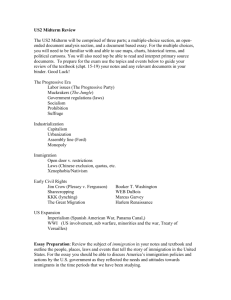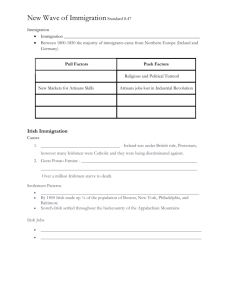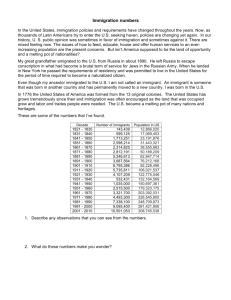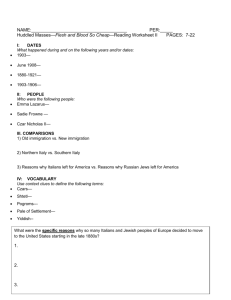Co-Author, “Prosecutors, Aim Your Weapons -
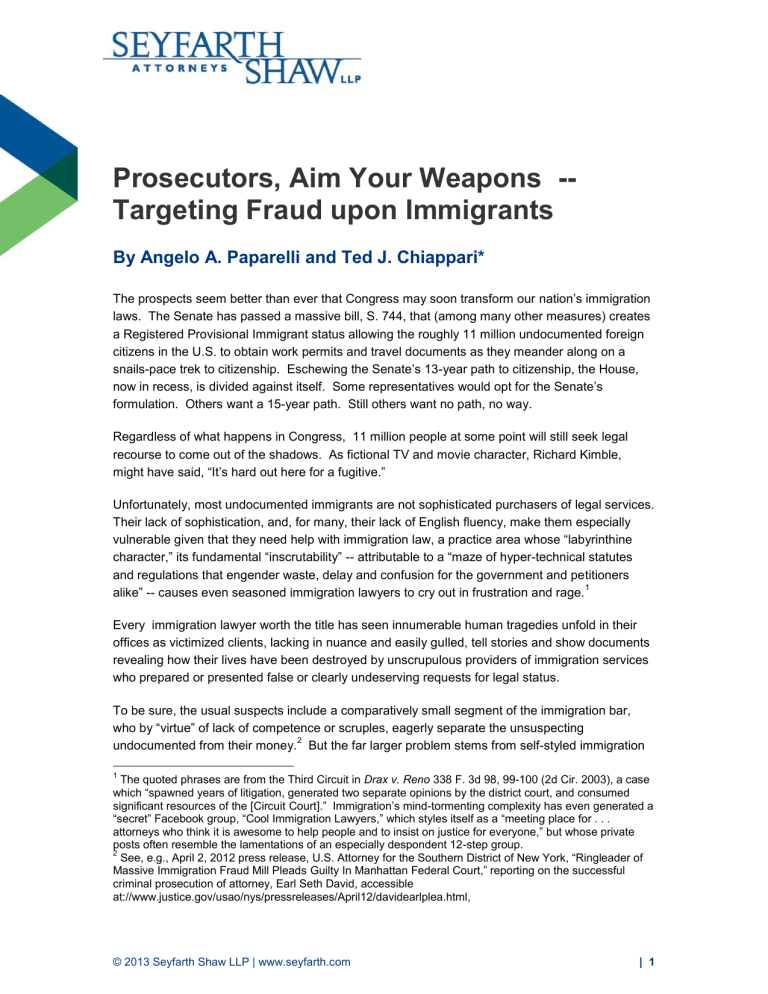
Prosecutors, Aim Your Weapons --
Targeting Fraud upon Immigrants
By Angelo A. Paparelli and Ted J. Chiappari*
The prospects seem better than ever that Congress may soon transform our nation’s immigration laws. The Senate has passed a massive bill, S. 744, that (among many other measures) creates a Registered Provisional Immigrant status allowing the roughly 11 million undocumented foreign citizens in the U.S. to obtain work permits and travel documents as they meander along on a snailspace trek to citizenship. Eschewing the Senate’s 13-year path to citizenship, the House, now in recess, is divided against itself. Some representatives would opt for the Senate’s formulation. Others want a 15-year path. Still others want no path, no way.
Regardless of what happens in Congress, 11 million people at some point will still seek legal recourse to come out of the shadows. As fictional TV and movie character, Richard Kimble, might have sa id, “It’s hard out here for a fugitive.”
Unfortunately, most undocumented immigrants are not sophisticated purchasers of legal services.
Their lack of sophistication, and, for many, their lack of English fluency, make them especially vulnerable given that they need help with immigration law, a practice area whose “labyrinthine character,” its fundamental “inscrutability” -- attributable to a “maze of hyper-technical statutes and regulations that engender waste, delay and confusion for the government and petitioners alike” -- causes even seasoned immigration lawyers to cry out in frustration and rage.
1
Every immigration lawyer worth the title has seen innumerable human tragedies unfold in their offices as victimized clients, lacking in nuance and easily gulled, tell stories and show documents revealing how their lives have been destroyed by unscrupulous providers of immigration services who prepared or presented false or clearly undeserving requests for legal status.
To be sure, the usual suspects include a comparatively small segment of the immigration bar, who by “virtue” of lack of competence or scruples, eagerly separate the unsuspecting undocumented from their money.
2
But the far larger problem stems from self-styled immigration
1
The quoted phrases are from the Third Circuit in Drax v. Reno 338 F. 3d 98, 99-100 (2d Cir. 2003), a case which “spawned years of litigation, generated two separate opinions by the district court, and consumed significant resources of the [Circuit
Court].” Immigration’s mind-tormenting complexity has even generated a
“secret” Facebook group, “Cool Immigration Lawyers,” which styles itself as a “meeting place for . . . attorneys who think it is awesome to help people and to insist on justice for ev eryone,” but whose private posts often resemble the lamentations of an especially despondent 12-step group.
2 See, e.g., April 2, 2012 press release, U.S. Attorney for the Southern District of New York, “Ringleader of
Massive Immigration Fraud Mill Pleads Guilty In Manhattan Federal Court,” reporting on the successful criminal prosecution of attorney, Earl Seth David, accessible at://www.justice.gov/usao/nys/pressreleases/April12/davidearlplea.html,
| 1 © 2013 Seyfarth Shaw LLP | www.seyfarth.com
consultants and “notarios” who piggy back on the formal office of notario publico which exists in many Latin American countries and promise unattainable immigration miracles, as U.S.
Citizenship and Immigration Services (USCIS) explains:
In many Latin American countries, the t erm “notario publico” (for “notary public”) stands for something very different than what it means in the United States. In many Spanish-speaking nations, “notarios” are powerful attorneys with special legal credentials. In the U.S., however,
[notaries public] are people appointed by state governments to witness the signing of important documents and administer oaths. "Notarios publico” are not authorized to provide you with any legal services related to immigration.
Resource pages from USCIS’s website offer “tools to help . . . avoid scammers” and describe in clinical terms what can go awry, “because the Wrong Help Can Hurt.” The agency warns that
“going to the wrong place can: [d]elay your application or petition; [c]ost you unnecessary fees;
[and][p]os sibly lead to removal proceedings.” 3
The challenge, however, for federal and state governments attempting to regulate providers of immigration services goes far beyond the many under-the-radar notarios and consultants who close in one location as soon as governmental heat approaches only to reopen elsewhere.
Websites, created at seemingly modest cost, offer to prepare “earned legalization” applications even though no federal law yet exists which provides any legal basis for this putative immigration benefit.
4
In addition, commercial services have recently sprung up, modeled after software companies like LegalZoom and TurboTax, which promise to automate the completion of immigration forms and help individuals apply directly for immigration benefits.
5
Numerous cases and opinions from immigration agencies have held, however, that the selection of an immigration form requires legal judgment and therefore involves the practice of law.
6
Only limited exceptions allow non-attorneys to prepare forms and represent parties before federal immigration agencies. The Board of Immigration Appeals (BIA) is authorized to certify
“accredited representatives” employed by any “non-profit religious, charitable, social service, or
3
USCIS resources offering tips to avoid unscrupulous immigration providers can be accessed at http://1.usa.gov/iZiStr (all links active as of Aug. 20, 2013). Similarly, see www.StopNotarioFraud.org, a website produced and maintained by the American Immigration Lawyers Association, and the Fight Notario
Fraud p roject of the American Bar Association’s Commission on Immigration, accessible at: http://bit.ly/JXqeMd.
4
For one such provider, see the website of Rapid Immigration Assistance Ltd (dba RIA International
Limited), accessible at: www.riaint.com.
5
6
See, e.g., Clearpath, Inc. (www.clearpathimmigration.com) and VisaEase, Inc. (www.visaease.com).
See, e.g., Unauthorized Practice Committee, State Bar of Texas v. Cortez , 692 S.W.2d 47 (Tex. 1985);
Florida Bar v. Moreno-Santana , 322 So. 2d 13, 15 (Fla. 1975); Franklin v. Chavis , 640 S.E.2d 873 (S.C.
2007); Oregon State Bar v. Ortiz , 77 Or App 532, 713 P2d 1068 (1986); Opinion of the General Counsel,
Immigration and Naturalization Service (INS), Genco opinion 93-25, CO 292.2 April 20, 1993, AILA InfoNet
Doc. No. 93042090; Memorandum from Doris M. Meissner, INS Commissioner, to all INS offices, Practice of
Law by Unlicensed “Immigration ‘Brokers’,” File No. HQ 292-P (Jan. 18, 1995), reported on and reproduced in 72 Interpreter Releases 529, 538 (Apr. 17, 1995).
© 2013 Seyfarth Shaw LLP | www.seyfarth.com | 2
similar organization established in the United States” so long as the organization “makes only nominal charges and assesses no excessive membership dues for persons given assistance” and “has at its disposal adequate knowledge, information and experience.” 7
Accredited representatives must be persons of good moral character with proven “experience and knowledge of immigration and naturalization law.” 8
Legal Weapons
Prosecutions for the unauthorized practice of immigration law occur irregularly among the states.
Texas and Florida have been particularly vigilant in securing injunctions proscribing the activities of nonlawyer individuals and entities engaged in immigration consulting. Aside from a 1939 case finding no unauthorized practice of immigration law on its particular facts, and three bar disciplinary actions involving lawyers engaged by immigration consultants, New York has apparently shown little inclination to prosecute the delivery of immigration-related legal services by unlicensed persons.
9
In any event, relying solely on unauthorized-practice statutes is an inadequate prosecutorial response. Garden variety cases of fraud upon immigrants also routinely involve violations of civil laws penalizing the preparation of falsely made documents,
10
and deceptive trade practices,
11
as well as transgressions of criminal statutes punishing perjury, immigration fraud, theft, mail fraud, wire fraud, conspiracy and a host of predicate state or federal offenses under the Racketeer
Influenced and Corrupt Organizations Act (18 U.S.C. §§ 1961-68). A variety of available legal resources make pursuing scammers of immigrants cost effective.
12
Moreover, if government prosecutors are ill equipped or resourced to take on the challenge alone, then perhaps another
7
8 CFR §§ 292.2(a) and 1292.2(a).
8
8 CFR §§ 292.2(d) and 1292.1(a)(4). Limited exceptions also exist in companion sections of the cited regulations for certain reputable individuals with a preexisting relationship to the foreign applicant or respondent and law students under supervision. In addition, a broad and ill-advised exception allows nonattorney agents of employers or foreign beneficiaries to file applications for labor certification -- a predicate step to obtaining employment-based immigration benefits -- with the U.S. Department of Labor. See 20
CFR § 656.10(b). Moreover, California, alone among the states, allows “immigration consultants” to prepare forms on behalf of immigration petitioners and applicants under limited and regulated circumstances. See
Calif. Bus. & Prof Code §22440-22447.
9
See, Careen Shannon, Regulating Immigration Legal Service Provider: Inadequate Representation and
Notario Fraud , 78 Fordham L. Rev. 577 (2009)(available at: http://ir.lawnet.fordham.edu/flr/vol78/iss2/6).
10
11
See Immigration and Nationality Act § 274C, 8 U.S.C. § 1324c (“Penalties for Document Fraud”).
See, e.g., N.Y. GBS. LAW § 349 : NY Code -
Section 349 (“Deceptive acts and practices unlawful”), and
Texas Deceptive Trade Practices – Consumer Protection Act, TEX. BUS. &COMM. CODE § 17.41 et seq. A sample complaint under this Texas statute can be accessed at: https://www.oag.state.tx.us/newspubs/releases/2005/020905ramirez.pdf
12 See Lilia S. Velasquez, “Quick and Dirty Guide to the Unauthorized Practice of Law,”
20th Annual
California Chapters Handbook 11 (AILA 2007); Jason Abrams and Thomas E. Fulghum, “Battling Against
Notarios: Waging War against the Unlicensed, Unqualified, and Incompetent,”
Immigration & Nationality Law
Handbook 123 (200910 ed.); Barbara K. Strickland, “Combating the Unauthorized Practice of Law in
Immigration Law: The Impossible Dream?,”
Immigration Practice Pointers 79 (2010-11 ed.); Deborah J.
Notkin, “Combating the Unauthorized Practice of Law,” 24 AILA's Immigration Law Today 6 (Nov./Dec.
2005), Katherine Brady, “Immigration Consultant Fraud: Laws and Resources,”
Immigrant Legal Resource
Center (March 2000)(accessible at: www.ilrc.org/files/district_attorney_manual.pdf).
© 2013 Seyfarth Shaw LLP | www.seyfarth.com | 3
avenue is available under the federal false claims ( qui tam ) statute.
13
This law allows private lawyers, known technically as relators but popularly as bounty hunters, to file suit on behalf of the
United States for fraud or false statement in connection with federal programs and earn legal fees, expenses and a percentage of civil fines and damages recovered in a successful prosecution.
14 The statute targets any individual or entity that “knowingly presents, or causes to be presented, a false or fraudulent claim for . . . approval.” The term, “claim” is defined to include
“any request or demand, whether under a contract or otherwise, for . . . property.” It would take little stretch of zealous advocacy for a relator to persuade a federal court that a petition or application prepared by an immigration notario requesting the grant of an immigration benefit
(such as legal status, a visa or green card) is a “claim” for a form of intangible right of “property.”
Action Needed Now
In any case, whether initiated by government prosecutors or private attorneys general, action must be taken soon. With the possibly imminent enactment of comprehensive immigration reforms allowing legal status for the undocumented, state and federal prosecutors and private relators must prepare now to bring to justice unlicensed, incompetent, unscrupulous or malevolent immigration service providers.
The readily avoidable harm to vulnerable aspiring immigrants that prompt prosecutions would prevent is inestimable. The potential benefits to our country and our justice system by the grant of immigration status and benefits solely to deserving recipients is likewise incalculable.
Prosecutors, aim your weapons.
--------
*Angelo A. Paparelli is a partner at Seyfarth Shaw in New York and Los Angeles. Ted J.
Chiappari is a partner at Satterlee Stephens Burke & Burke in New York City. The authors thank
Olivia M. Sanson, an associate at Satterlee Stephens Burke & Burke LLP, for her assistance in the preparation of this article.
13
31 U.S.C. § 3729 –3733.
14
For background on the qui tam statute, see generally David Freeman Engstrom, “Harnessing the Private
Attorney General: Evidence From Qui Tam Litigation,” Columbia Law Review , Vol. 112:1244 (2012).
© 2013 Seyfarth Shaw LLP | www.seyfarth.com | 4





